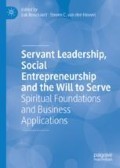Abstract
Aldous Huxley’s dystopian novel Brave New World (1932) is a tale of a technocratic world where man has lost its identity, individuality and freedom, all replaced by a false and artificial feeling of happiness. Very soon after its publication Huxley started arguing that his novel had become a reality. The economy was increasingly based on mass production combined with mass distribution and a high capital concentration, destroying the middle classes. In both communist and capitalist states, a ‘power elite’ was increasingly controlling a reservoir of slaves, conditioned by marketing (by huge capitalist corporations) or propaganda (by a communist state). In short, Huxley identified an invisible slavery which is normal ‘only in relation to a profoundly abnormal society’. Huxley’s answer was to convert entrepreneurs and leaders into ‘pragmatic contemplatives’, reacting against a basic contradiction in the socio-economic system. On the one hand, producers and consumers have actually become slaves to a large-scale, all-controlling and centralizing state-capitalist system. On the other hand, in theory rising labor productivity should allow people, including entrepreneurs and leaders, to focus leisure and contemplation. This contradiction invites contemplation and action becoming part of a circle where both are at the same time a means and an end. Instead of abusing spirituality ‘on the working floor’ to increase productivity even more, the seeds should be sown for a new kind of ‘anarchist’ (outside the ‘system’) entrepreneurship, based on ‘spiritual capital’.
Access this chapter
Tax calculation will be finalised at checkout
Purchases are for personal use only
References
Bridgeman, J H (ed.) & Huxley, A 1941–1964/2013, The Divine Within. Selected Writings on Enlightenment, Harper Perennial, New York.
De Vylder, G 2013, ‘From Oriental Utopia to Business Ethics: Europe’s Search for New Socioeconomic Paradigms in Eastern Religions and Philosophies’, Sharma, A & Khanna, M (eds.), Asian Perspectives on the World’s Religions after September 11, Praeger/ABC-Clio, Santa Barbara., pp. 69–88.
De Vylder, G & Opdebeeck, H 2016, ‘Indian Spiritual Traditions as Inspiration for Ethical Leadership and Management in Europe’, Chatterji, M & Zsolnai, L (eds.), Ethical Leadership. Indian and European Spiritual Approaches, Palgrave Macmillan/Springer Nature, London, pp. 85–106.
De Vylder, G 2017, ‘Tussen utopisme en nationalisme’, Bouckaert, L. (ed.), Spiritualiteit in Actie. Mahatma Gandhi, SPES-Forum/Yunus Publishing, Leuven-Gent, pp. 41–60.
Fischer, D E 1995, ‘The System versus the Soul’, Defoore, B & Renesch, J (eds.), Rediscovering the Soul of Business. A Renaissance of Values, NewLeadersPress/Sterling & Stone, San Francisco, pp. 181–194.
Huxley, A 1932/1980, Brave New World, Granada Publishing, London.
Huxley, A 1937/1941, End and Means. An Enquiry into the Nature of Ideals and into the Methods employed for their Realization, Chatto & Windus, London.
Huxley, A 1941/2005, Grey Eminence, Vintage Books/Random House, London.
Huxley, A 1945/2013, The Perennial Philosophy, Lightning Source/Stellar Classics, Milton Keynes.
Huxley, A 1958/1994, Brave New World Revisited, Vintage Books, London.
Huxley, A 1962/1963, Island, Harper & Row/Bantam Book, New York.
Opdebeeck, H (ed.) 2013, Responsible Economics. E.F. Schumacher and His Legacy for the 21st Century, Peter Lang, Bern.
Rifkin, J 1995, The End of Work. The Decline of the Global Labor Force and the Dawn of the Post-Market Era, G.P. Putnam’s Sons, New York.
Shah-Kazemi, R 2009, Paths to Transcendence According to Shankara, Ibn Arabi, and Meister Eckhart, World Wisdom/Indica Books, Bloomington-Varanasi.
Author information
Authors and Affiliations
Corresponding author
Editor information
Editors and Affiliations
Rights and permissions
Copyright information
© 2019 The Author(s)
About this chapter
Cite this chapter
De Vylder, G. (2019). Aldous Huxley’s Anarchist Entrepreneurship Based on Spiritual Capital. In: Bouckaert, L., van den Heuvel, S. (eds) Servant Leadership, Social Entrepreneurship and the Will to Serve. Palgrave Macmillan, Cham. https://doi.org/10.1007/978-3-030-29936-1_17
Download citation
DOI: https://doi.org/10.1007/978-3-030-29936-1_17
Published:
Publisher Name: Palgrave Macmillan, Cham
Print ISBN: 978-3-030-29935-4
Online ISBN: 978-3-030-29936-1
eBook Packages: Religion and PhilosophyPhilosophy and Religion (R0)

